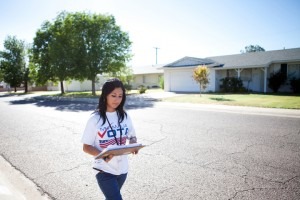A clipboard full of voter registration forms can easily be taken door-to-door or, say, to concerts and music festivals. But a Xerox machine? Not so much.
Arizona’s Attorney General Tom Horne visited the Supreme Court yesterday to appeal for the re-validation of Proposition 200, a measure that would require individuals in Arizona without in-state qualifying ID to provide proof of citizenship (often a photocopy of something like a passport or birth certificate) when registering to vote using the federal voter registration form. The proof of citizenship clause has been alternately approved and stricken down by various courts. The most recent ruling on the bill was by a Circuit Court which got rid of the law, declaring that it didn't uphold the federal National Voter Registration Act (NVRA).
The Brennan Center, along with voting rights and minority interest groups, have drawn up a brief for the Supreme Court outlining why they are against it. The brief finds negative consequences of Proposal 200 and details how the measure disproportionately affects certain groups such as “low income persons, racial and ethnic minorities, the young and naturalized citizens.” It also describes how it makes it “immensely more difficult for community registration to take place”.
There are also concerns that the law is unconstitutional for violating the NVRA. The NVRA was passed in 1993 to make registering to vote easier. Voters are required to affirm they are U.S. citizens, but does not require them to provide evidence of citizenship. When Proposition 200 was law, voters in Arizona filled out the same federal form as people in other states, but if they did not provide evidence of their citizenship along with this form, their registrations could be rejected. Even if they were verifiable citizens who had signed an affidavit stating that fact, their registration could be invalidated. Some feel that laws like this one are a slippery slope. Doug Kendall, president of the Constitutional Accountability Center said, “If the Court accepts Arizona’s most sweeping arguments against the NVRA, its ruling could severely limit Congress’ power to protect the right of Americans to register to vote.”
Proposition 200 was first introduced in the state in 2004. The measure was drafted to introduce the requirement of proof of citizenship when voting and when applying for public benefits. Those behind it hoped to limit undocumented immigrants’ access to public benefits and voting and promoted the bill as such. At the time many spoke out against to flaws of the proposal, and opposition was bi-partisan. Some of the state's leading Republican and Democratic figures, including John McCain, were against it. However the bill managed to garner enough support to be passed by Arizona voters, with 56% of the vote in November 2004.
Fears that if the law comes back into play the case could set a precedent leading to more far reaching outcomes are worth noting. The states of Alabama, Georgia, Kansas and Tennessee already have comparable registration requirements, and according to officials, 12 other states are considering the introduction of similar legislation. U.S. Solicitor General Donald B. Verrilli Jr. discussed how other states may seek to add additional documentation to their list of requirements for voter registration, explaining how this “could extend to any eligibility criteria beyond citizenship, such as age, residency, mental competence, or felony history."
A ruling on yesterday's hearing is expected sometime this summer. Whatever happens, it is not only the citizens of Arizona who should be watching closely.

